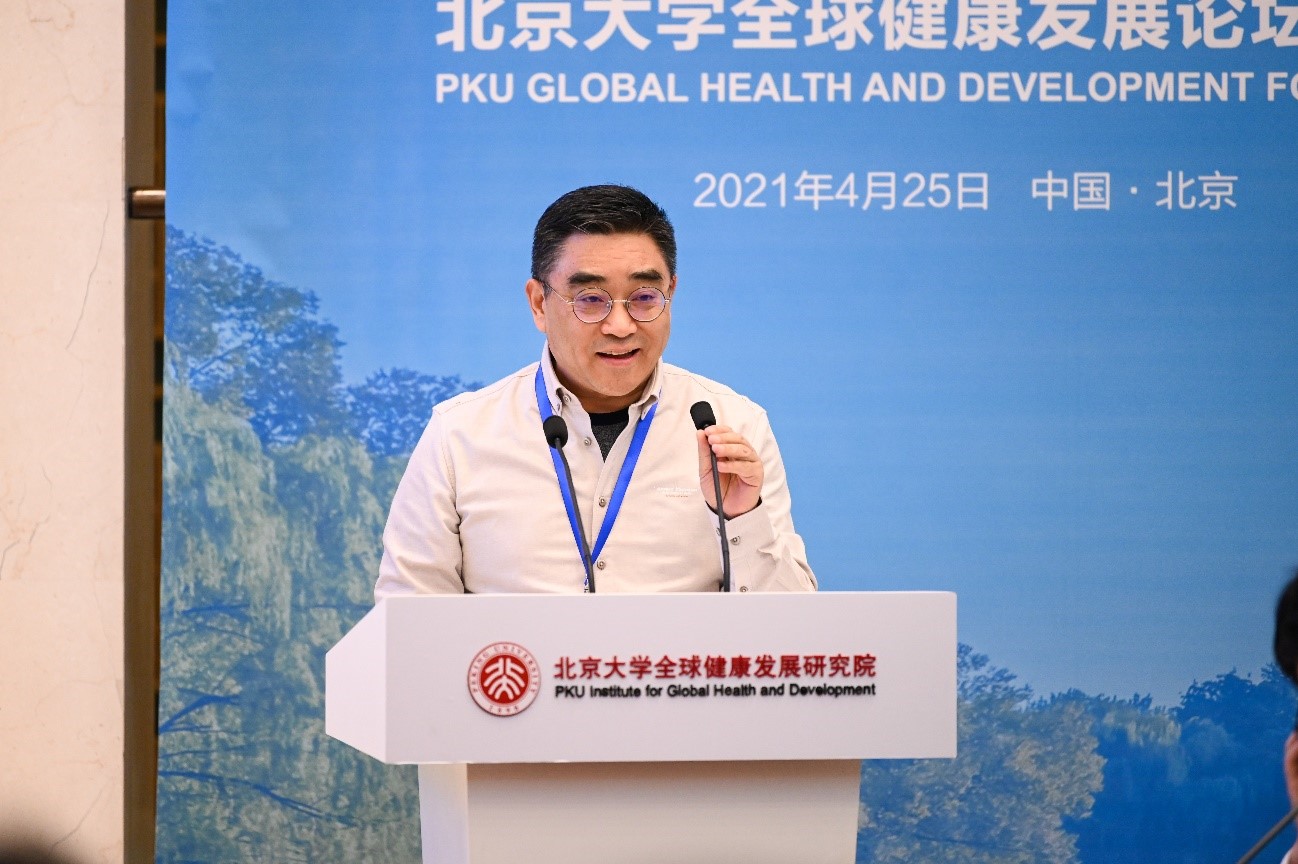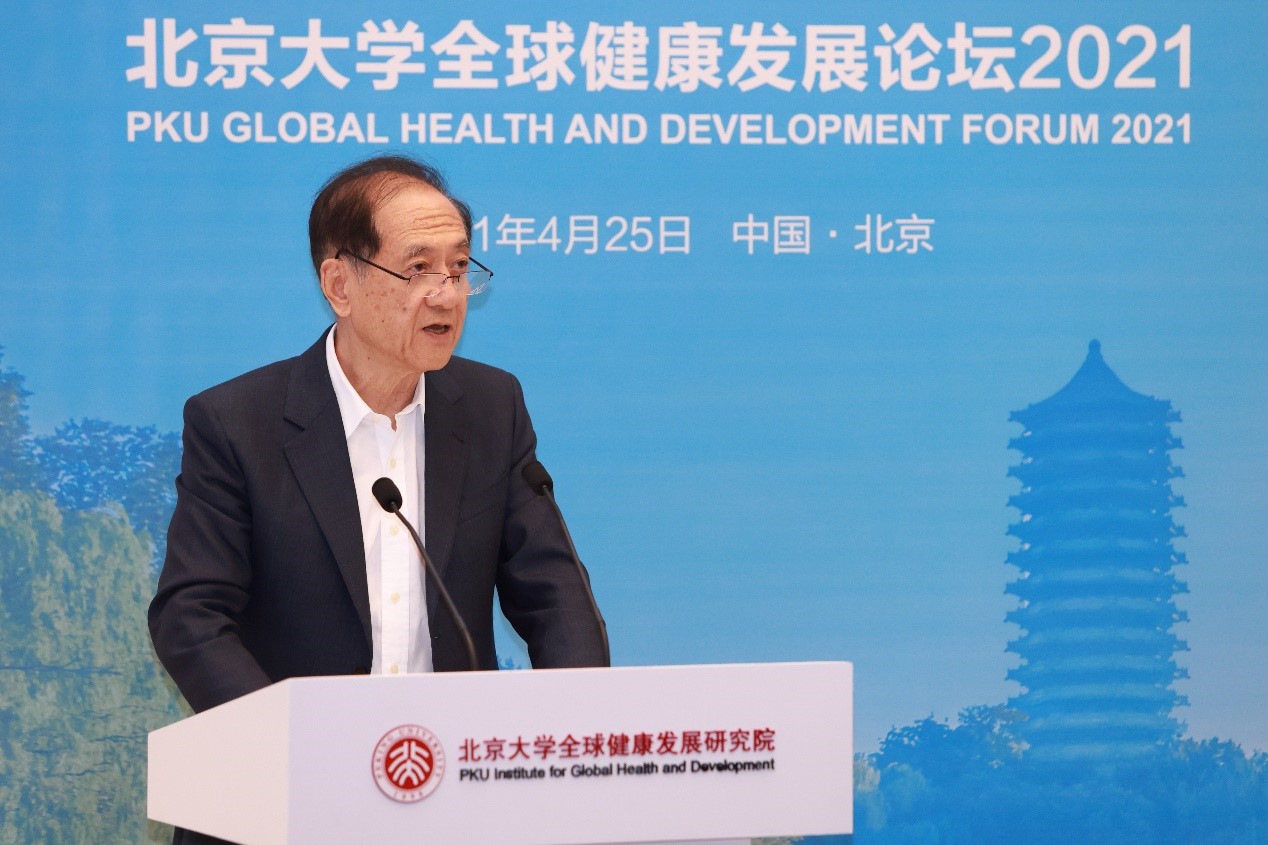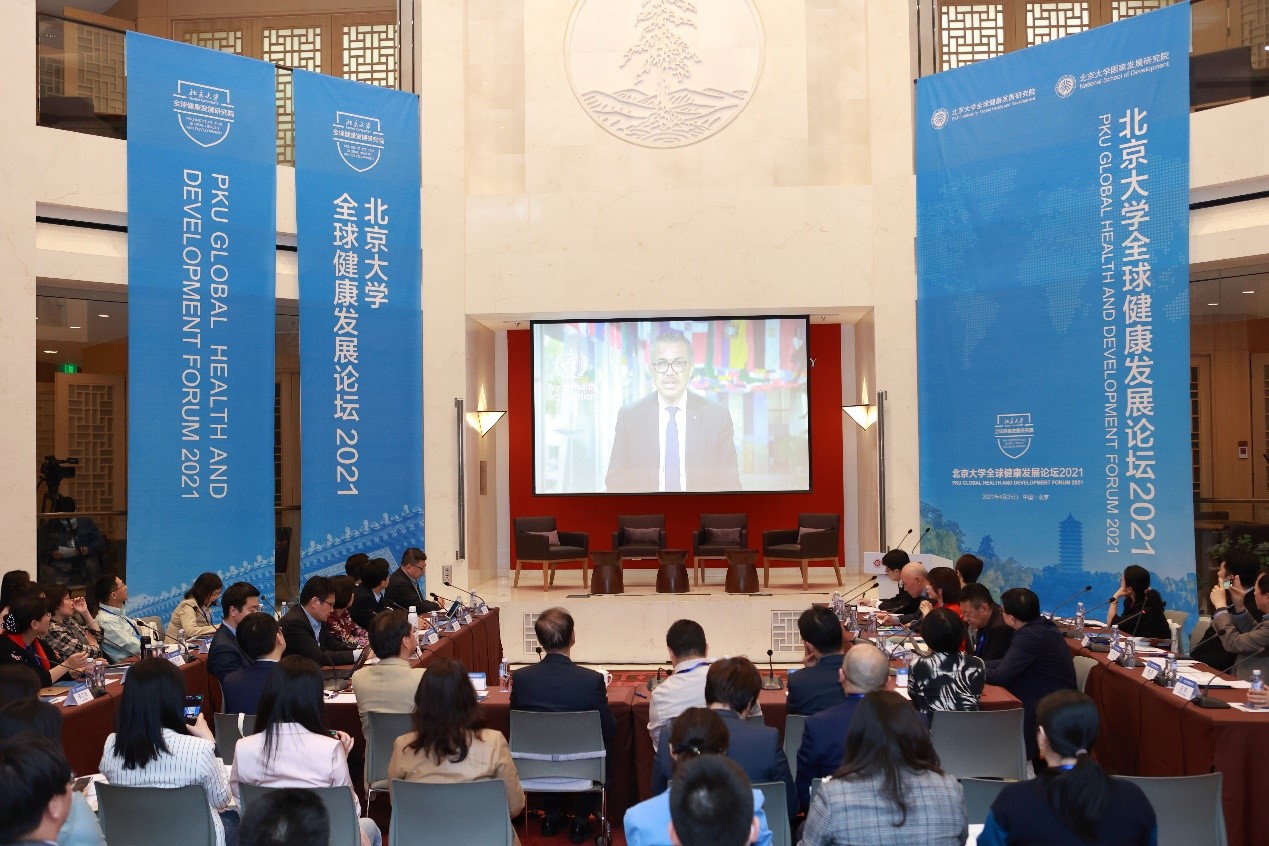Peking University, May 3, 2021: On
April 25, 2021, Dr. Han Qide, honorary chairman of the China
Association for Science and Technology, and Dr. Tedros Adhanom
Ghebreyesus, WHO director-general were among the distinguished speakers
for the Peking University Global Health and Development Forum 2021. The
Forum was jointly hosted by Peking University Institute for Global
Health and Development and National School of Development, aiming to
explore new strategies for international cooperation in response to the
COVID-19 pandemic, and to share research achievements in digital health
and access to medicine. Distinguished guests from academia, governments,
industries, and international agencies including WHO, United Nations,
Global Fund, World Bank, the Chinese Consortium of Universities for
Global Health (CCUGH), as well as colleagues from Peking University
Institute of South-South Cooperation and Development participated in the
Forum online and offline.
Opening remarks
Professor Gordon Liu, dean of Peking University Institute for Global
Health and Development, moderated the opening session. He said that the
human world had experienced chaos since the outbreak of COVID-19, today
we are fortunate enough to be able to conduct much of our activities for
normal life while continuing to cope with the pandemic challenges;
however, we still need to be alert and address critical issues in global
health in general and the pandemic in particular.
Gordon G. Liu at opening remarks
Professor Han Qide, co-chair of the Advisory Council, PKU Institute for
Global Health and Development, emphasized three essential points: First,
viruses have no borders. The COVID-19 pandemic has made it clear that
the fate of human race is connected with each other and collaboration at
the global scale is a must for us to fight and win the battle. Second,
the pandemic is like an alarm bell, highlighting our awareness of the
importance of health and how we need to improve our public health and
healthcare system to be better prepared for COVID-19 and other future
threats to health. Third, economic development plays an important role
in promoting human health in general and fighting against COVID-19 in
particular. Since the outbreak of COVID-19, we have witnessed
development and innovation on many fronts. Development not only includes
how we interact and collaborate with each other, but even how we live,
study and work. Digital health is a good example.
Han Qide at opening remarks
Dr. Tedros Adhanom Ghebreyesus, WHO director-general, emphasized that we
must address the disparity in access to, quality and safe use of
digital health technologies in low income and underserved communities.
An overarching challenge to digital health is to preserve the privacy,
safety and integrity of individual health data. WHO Global Strategy on
Digital Health is designed to help countries adopt these 21st century
tools as part of their journey towards universal health coverage while
strengthening governance and data protection.
Dr. Tedros Adhanom Ghebreyesus at opening remarks
Dr. Peter Sands, executive director of Global Fund, said that the
pandemic had underscored the need for a digital revolution in healthcare
delivery and showed how fundamental it was. We need a massive and
rampant change in how we manage health information and data aggregation.
Countries need not only more funds to build their digital capabilities
but also better solutions, more technical support and paths to spend
that money well.
Dr. Siddharth Chatterje, United Nations resident coordinator in China,
quoted the words of the philosopher Herophilus, “without health, we
don’t have strength; without intelligence, we don’t have wealth” to
emphasize that stronger health systems and universal health coverage
must occur to achieve sustainable development. He introduced ongoing
actions in Africa to illustrate how we can harness big data and
innovation to leapfrog stronger health system and universal health
coverage.
Steve Davis, senior China strategy adviser, interim director for the
China Country Office, the Bill & Melinda Gates Foundation, believes
that China has an even greater potential for becoming an effective
provider of global, public goods in the future. He offered two ideas on
how China could leverage its unique position to further its global
efforts in supplying affordable quality health products. Frist, to
maximize the impact and minimize the cost of global goods, it is
imperative that we think holistically about the full journey of these
products across the entire value chain from beginning to end, what
activities should be done and what resources must be mobilized in
different stages. Second, we must accelerate the drive for affordable,
digital public goods and global health.
Session I: Global cooperation against pandemic
Professor Fu Jun, academic dean of Peking University Institute of
South-South Cooperation and Development, moderated the session and gave a
speech on Global Health and Crisis Management. He introduced the 4R
model of crisis management: recognition, readiness, response and
recovery, and discussed China's performance in COVID-19 and SARS within
this framework.
Professor Zha Daojong, from Peking University School of International
Studies gave a talk on Fair Access for All to Coronavirus Vaccines. He
introduced four points to promote fair access of Coronavirus vaccine
from the perspectives of policy interference, manufacturing capacity,
regulatory pre-approval mechanism and public education and publicity.
Zhang Li, director of Strategic Innovation and New Investors Hub at
Gavi, delivered a talk on COVAX mechanism and progress. She briefly
introduced Gavi's mission and Gavi's efforts to improve vaccine
accessibility in low - and middle-income countries. She believes that
the effectiveness and global accessibility of the new vaccines are
crucial to the development of the world economy.
Somil Nagpal, health sector coordinator of World Bank Jakarta,
Indonesia, spoked on Ensuring access to COVID vaccines in emerging
economies: The case of Indonesia. He introduced Indonesia's COVAX
vaccination plan and the current vaccination situation, and also talked
about the measures taken by Indonesia to improve the national
accessibility of COVAX.
Session II: Digital health and medicine
Professor Qin Xuezheng, associate dean of Peking University School of
Economics and Institute for Global Health and Development, moderated
this session.
Professor Zhang Luxia, associate dean of Peking University National
Institute of Health Data Science, discussed Health AI – Experience from
China. She said that the state council issued a number of new policies
related to artificial intelligence to encourage the local government to
establish AI application and to pilot AI-relevant new policies. In 2018,
the definition and standards of medical AI products was firstly
included in categories and classification list of medical devices by the
national medical products administration, which is a benchmark to
indicate that AI medicine has already transitioned from application to
commercialization in China. But the effectiveness and validity of health
AI products need to be proved by clinical trials and we need more
industry partners to be interested in that kind of studies and to be
involved.
Dr. Wu Xiaobin, BeiGene global president & global chief operation
officer, delivered a speech on Post COVID-19, Perspectives on
Globalization of China Innovative Medicine Industry. Very few people
realized that in the space of bio tech, China made great progress in the
past few years. Many innovative products manufactured by local Chinese
innovative companies have been approved to enter the market. China’s bio
tech industry will be working together with multinational biotech
companies to provide the patients with more affordable medicine and
service.
Ouyang Qiong, CEO of Hangzhou AIMed Technology, made a presentation on
Intelligent Assistant for Healthcare Professionals and Patients. As one
of the major business communication tools, chat bots use massive data
analyses of doctor patient online communication to have insights on real
needs. Real-time information is automatically captured to generate up
to date medical content and deliver evidence to healthcare
professionals. The intelligent medical reports can empower doctors and
educate patients, improve diagnosis accuracy and increase the
capabilities of medicine.
Liz Ashall-Payne, co-founder and CEO of ORCHA, spoked on Supporting the
Digital Patient. Digital health applications have emerged in the context
of digital medicine, but their widespread and effective adoption still
faces four major obstacles: awareness, accessibility, trust and ongoing
governance. Only when these issues are addressed will people and
patients truly have access to high-quality digital health tools.
Session III: Global health governance
Professor Zheng Zhijie, associate dean of Peking University Institute
for Global Health and Development, moderated this session. He also gave a
talk on PKU Global Health Programs, focusing on challenges and
opportunities of global health, aiming to train the next generation
leaders, develop oversea R&E infrastructure, conduct global health
research, explore ways of collaboration, and engage in global
governance.
Professor Hao Yuantao’s presentation was about Data Analysis for
Epidemic Control and Prevention: A Systematic Review and Meta-analysis
of COVID-19 Reproduction Numbers. Comprehensive interventions and
lockdowns would be effective for reducing COVID-19 transmission and
avoiding future outbreaks. Since lockdowns cannot last forever, multiple
measures are more recommended for governments.
Professor Wang Youfa, dean of Global Health Institute, Xi’an Jiaotong
University, spoke on Noncommunicable Disease (NCD) Prevention &
Control & International Collaboration. Prevalence of NCDs is high,
and management is inadequate; 85% of these "premature" (<70 years)
deaths occur in low- and middle-income countries and the high costs of
NCD treatment, combined with loss of income, force millions of people
into poverty annually
Professor Zhou Yongmei, from Peking University Institute of South-South
Cooperation and Development, gave a talk on Global Actions for Global
Challenges: the case of marine plastics. Plastics will harm marine life,
human health and economy. She further proposed that global actions are
required to control plastic emission.
Edited by: Huang Weijian
Source: Peking University Institute for Global Health and Development


